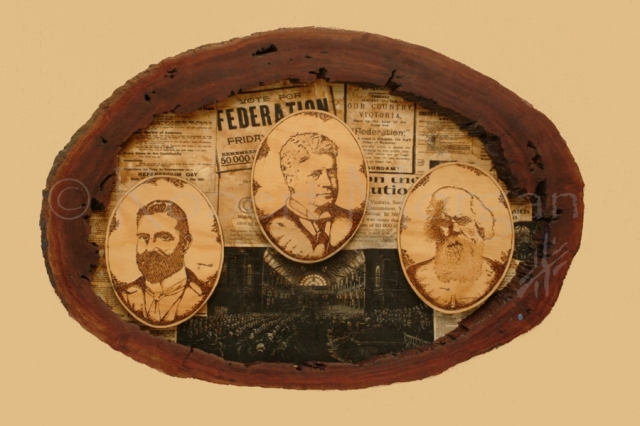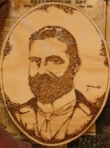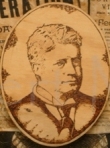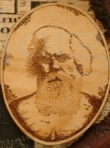The SANDS OF TIME Collection – 14. Federation
14. Federation
Alfred Deakin, Edmund Barton & Henry Parkes — 1020 x 685 mm
© Robert Morgan

ALFRED DEAKIN (1856-1919)
Prime Minister
 Alfred Deakin was born at Collingwood, Victoria on 3 August 1856 and educated at Melbourne Church of England Grammar School and the University of Melbourne. In 1878 he became a barrister but he didn’t enjoy the work. The following year he won the seat of West Bourke in the Victorian Legislative Assembly. He was the member for West Bourke from 1879 to 1889 and the member for Essendon from 1889 to 1900. During this twenty-one-year period he held a number of posts and sat on numerous committees. However it was the work he did persuading many recalcitrant Victorian politicians of the value of Federation which was so important during this time.
Alfred Deakin was born at Collingwood, Victoria on 3 August 1856 and educated at Melbourne Church of England Grammar School and the University of Melbourne. In 1878 he became a barrister but he didn’t enjoy the work. The following year he won the seat of West Bourke in the Victorian Legislative Assembly. He was the member for West Bourke from 1879 to 1889 and the member for Essendon from 1889 to 1900. During this twenty-one-year period he held a number of posts and sat on numerous committees. However it was the work he did persuading many recalcitrant Victorian politicians of the value of Federation which was so important during this time.
Deakin was truly one of Australia’s founding fathers. He actively advocated Federalism, from 1899-1903 he worked closely with Edmund Barton, Australia’s first Prime Minister, he ensured that the Federation Bill had a smooth passage through the British Parliament, helped to form the first ministry, and was Australia’s first Attorney-General.
When Edmund Barton retired from politics in 1903 Deakin became Prime Minister. Deakin was Prime Minister three times – 1903-04, 1905-08 and 1909-10. During this period he did much to provide the focus and direction for Australia right up to World War I. Deakin retired from politics in 1913 and died in Melbourne on 7 October 1919.
◊
SIR EDMUND BARTON (1849-1920)
First Prime Minister
 Born in Glebe, New South Wales on 18 January 1849, Edmund Barton was educated at Sydney Grammar School and Sydney University and admitted to the Bar in 1871. In the mid-1870s he sought election to the New South Wales Legislative Assembly which he finally won, in 1879, on his third attempt. His parliamentary progress was rapid and by January 1883 he had become the youngest ever Speaker in the New South Wales Parliament. He immediately gained a reputation for his fair-mindedness and firm, clear decisions.
Born in Glebe, New South Wales on 18 January 1849, Edmund Barton was educated at Sydney Grammar School and Sydney University and admitted to the Bar in 1871. In the mid-1870s he sought election to the New South Wales Legislative Assembly which he finally won, in 1879, on his third attempt. His parliamentary progress was rapid and by January 1883 he had become the youngest ever Speaker in the New South Wales Parliament. He immediately gained a reputation for his fair-mindedness and firm, clear decisions.
He resigned the position of Speaker in 1887 and was immediately appointed to the Legislative Council. By this time he was gathering forces around him actively advocating the establishment of a Federal government. In 1889 he allied himself with Henry Parkes and 1891 he was a delegate to the National Australasian Convention in Sydney.
He re-entered the Legislative Assembly in 1891 as a committed Federalist and within two years was the effective leader of Federalist forces in New South Wales. Between 1893 and 1897 he addressed an estimated three hundred pro-Federation meetings and rallies. When a convention was called to draft a Federal Bill, Barton was made leader of the convention and chairman of the constitutional committee.
When the draft bill was put to a referendum Barton became its most passionate advocate. He finally saw his dream of a Federation of Australian States become a reality and on 31 December 1900 he was commissioned as Australia’s first Prime Minister. He resigned the prime ministership in 1903 and took a seat on the High Court. He served for seventeen years on the High Court and was awarded a knighthood and numerous honorary doctorates. He died suddenly on 7 January 1920.
◊
SIR HENRY PARKES (1815-1896)
Politician
 Born in Warwickshire, England on 27 May 1815. During forty-six years in parliament, Henry Parkes won the State premiership five times – in 1872, 1877, 1878, 1887 and 1889. This was an impressive achievement for a tenant farmer’s son, who began his working life as an ivory turner’s apprentice at eight and, with little schooling beyond the three Rs, educated himself through a passion for reading. Parkes and his wife and young baby arrived in Sydney, as assisted immigrants in 1839. For five years he worked, first as a farm labourer and then as a Customs House officer, before setting up his own business as an ivory and bone turner.
Born in Warwickshire, England on 27 May 1815. During forty-six years in parliament, Henry Parkes won the State premiership five times – in 1872, 1877, 1878, 1887 and 1889. This was an impressive achievement for a tenant farmer’s son, who began his working life as an ivory turner’s apprentice at eight and, with little schooling beyond the three Rs, educated himself through a passion for reading. Parkes and his wife and young baby arrived in Sydney, as assisted immigrants in 1839. For five years he worked, first as a farm labourer and then as a Customs House officer, before setting up his own business as an ivory and bone turner.
His introduction to political life came in 1848, when he acted as campaign helper for an aspiring election candidate, but it was not until 1854 that he himself entered parliament as member for Sydney. Between then and 1871 he was returned at various elections as member for East Sydney, Kiama and Mudgee respectively. Twice during the period he felt constrained to resign because of financial difficulties in his business activities, and in 1861 he was away in England for a time serving as an emigration officer. But in Sydney again in 1866 as Colonial Secretary he was able to introduce two pieces of legislation dear to his heart, namely the Public Schools Act and the Hospitals Act. Also, by arrangement with Florence Nightingale, the founder of modern nursing in England, he had the first trained nurses brought to New South Wales in 1868.
Parkes is remembered principally as an advocate of free trade between the States, the immigration of free settlers as opposed to convict transportees, free public education for all, and the federation of all the Australian colonies under ‘a great national government’. Thus his first term as Premier saw some easing of interstate trade duties and taxes as well as improved railway and telegraph communications. During his third term the Public Instruction Act became law, as did the Government Railways Act and the Public Works Act in his fourth ministry.
◊
